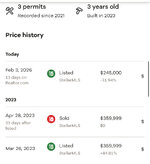Commercial real estate (downtown offices) seem to start to show some serious cracks. With assets being sold for half what they were bought few years ago.

 nypost.com
nypost.com
2025: The current year is viewed as transitional, with the anticipated recovery is expected to be gradual. Many properties will face refinancing challenges, but extend-and-pretend strategies may delay widespread distress.
2026-2027: These years represent the peak of the maturity wall, when the most significant refinancing challenges will occur. This period is most likely to see increased distressed sales and property value adjustments.
Post-2027: Market observers expect more normalized conditions to return as the bulk of problematic loans work through the system.

 press.hutfin.com
press.hutfin.com

Zara billionaire Amancio Ortega has sold a NYC office building for $50M — a staggering 60% loss
Even fashion moguls can’t escape New York City’s office slump, and that’s certainly the case with 366 Madison Ave.
Timeline and Market Outlook
Rather than asking "when" commercial real estate will crash, industry experts suggest focusing on "how" the market will adjust. The consensus points to a prolonged period of adjustment rather than a sudden collapse:2025: The current year is viewed as transitional, with the anticipated recovery is expected to be gradual. Many properties will face refinancing challenges, but extend-and-pretend strategies may delay widespread distress.
2026-2027: These years represent the peak of the maturity wall, when the most significant refinancing challenges will occur. This period is most likely to see increased distressed sales and property value adjustments.
Post-2027: Market observers expect more normalized conditions to return as the bulk of problematic loans work through the system.

When Will Commercial Real Estate Crash? Market Risks & Recovery
When will commercial real estate crash? Explore 2025 market risks, debt challenges, and recovery prospects in this in-depth analysis.
 press.hutfin.com
press.hutfin.com


